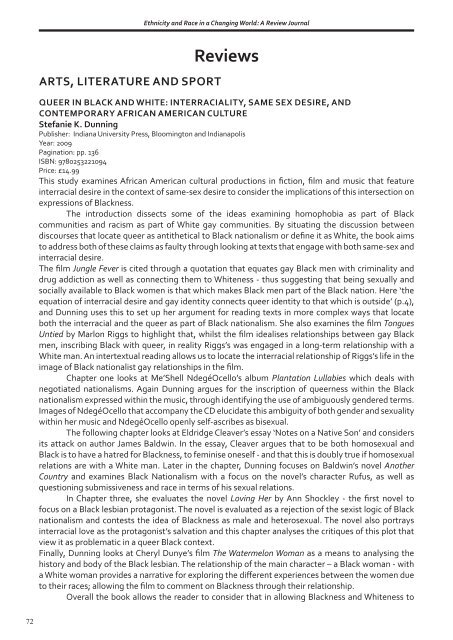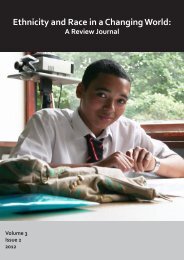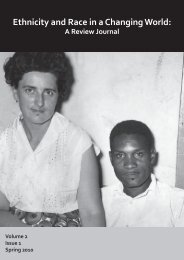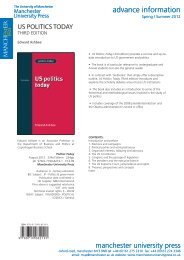<strong>Ethnicity</strong> <strong>and</strong> <strong>Race</strong> <strong>in</strong> a Chang<strong>in</strong>g <strong>World</strong>: A Review JournalARTS, LITERATURE AND SPORTReviewsQUEER IN BLACK AND WHITE: INTERRACIALITY, SAME SEX DESIRE, ANDCONTEMPORARY AFRICAN AMERICAN CULTUREStefanie K. Dunn<strong>in</strong>gPublisher: Indiana University Press, Bloom<strong>in</strong>gton <strong>and</strong> IndianapolisYear: 2009Pag<strong>in</strong>ation: pp. 136ISBN: 9780253221094Price: £14.99This study exam<strong>in</strong>es African American cultural productions <strong>in</strong> fiction, film <strong>and</strong> music that feature<strong>in</strong>terracial desire <strong>in</strong> the context of same-sex desire to consider the implications of this <strong>in</strong>tersection onexpressions of Blackness.The <strong>in</strong>troduction dissects some of the ideas exam<strong>in</strong><strong>in</strong>g homophobia as part of Blackcommunities <strong>and</strong> racism as part of White gay communities. By situat<strong>in</strong>g the discussion betweendiscourses that locate queer as antithetical to Black nationalism or def<strong>in</strong>e it as White, the book aimsto address both of these claims as faulty through look<strong>in</strong>g at texts that engage with both same-sex <strong>and</strong><strong>in</strong>terracial desire.The film Jungle Fever is cited through a quotation that equates gay Black men with crim<strong>in</strong>ality <strong>and</strong>drug addiction as well as connect<strong>in</strong>g them to Whiteness - thus suggest<strong>in</strong>g that be<strong>in</strong>g sexually <strong>and</strong>socially available to Black women is that which makes Black men part of the Black nation. Here ‘theequation of <strong>in</strong>terracial desire <strong>and</strong> gay identity connects queer identity to that which is outside’ (p.4),<strong>and</strong> Dunn<strong>in</strong>g uses this to set up her argument for read<strong>in</strong>g texts <strong>in</strong> more complex ways that locateboth the <strong>in</strong>terracial <strong>and</strong> the queer as part of Black nationalism. She also exam<strong>in</strong>es the film TonguesUntied by Marlon Riggs to highlight that, whilst the film idealises relationships between gay Blackmen, <strong>in</strong>scrib<strong>in</strong>g Black with queer, <strong>in</strong> reality Riggs’s was engaged <strong>in</strong> a long-term relationship with aWhite man. An <strong>in</strong>tertextual read<strong>in</strong>g allows us to locate the <strong>in</strong>terracial relationship of Riggs’s life <strong>in</strong> theimage of Black nationalist gay relationships <strong>in</strong> the film.Chapter one looks at Me’Shell NdegéOcello’s album Plantation Lullabies which deals withnegotiated nationalisms. Aga<strong>in</strong> Dunn<strong>in</strong>g argues for the <strong>in</strong>scription of queerness with<strong>in</strong> the Blacknationalism expressed with<strong>in</strong> the music, through identify<strong>in</strong>g the use of ambiguously gendered terms.Images of NdegéOcello that accompany the CD elucidate this ambiguity of both gender <strong>and</strong> sexualitywith<strong>in</strong> her music <strong>and</strong> NdegéOcello openly self-ascribes as bisexual.The follow<strong>in</strong>g chapter looks at Eldridge Cleaver’s essay ‘Notes on a Native Son’ <strong>and</strong> considersits attack on author James Baldw<strong>in</strong>. In the essay, Cleaver argues that to be both homosexual <strong>and</strong>Black is to have a hatred for Blackness, to fem<strong>in</strong>ise oneself - <strong>and</strong> that this is doubly true if homosexualrelations are with a White man. Later <strong>in</strong> the chapter, Dunn<strong>in</strong>g focuses on Baldw<strong>in</strong>’s novel AnotherCountry <strong>and</strong> exam<strong>in</strong>es Black Nationalism with a focus on the novel’s character Rufus, as well asquestion<strong>in</strong>g submissiveness <strong>and</strong> race <strong>in</strong> terms of his sexual relations.In Chapter three, she evaluates the novel Lov<strong>in</strong>g Her by Ann Shockley - the first novel tofocus on a Black lesbian protagonist. The novel is evaluated as a rejection of the sexist logic of Blacknationalism <strong>and</strong> contests the idea of Blackness as male <strong>and</strong> heterosexual. The novel also portrays<strong>in</strong>terracial love as the protagonist’s salvation <strong>and</strong> this chapter analyses the critiques of this plot thatview it as problematic <strong>in</strong> a queer Black context.F<strong>in</strong>ally, Dunn<strong>in</strong>g looks at Cheryl Dunye’s film The Watermelon Woman as a means to analys<strong>in</strong>g thehistory <strong>and</strong> body of the Black lesbian. The relationship of the ma<strong>in</strong> character – a Black woman - witha White woman provides a narrative for explor<strong>in</strong>g the different experiences between the women dueto their races; allow<strong>in</strong>g the film to comment on Blackness through their relationship.Overall the book allows the reader to consider that <strong>in</strong> allow<strong>in</strong>g Blackness <strong>and</strong> Whiteness to72
<strong>Ethnicity</strong> <strong>and</strong> <strong>Race</strong> <strong>in</strong> a Chang<strong>in</strong>g <strong>World</strong>: A Review Journal<strong>in</strong>teract with<strong>in</strong> them, each of these texts elucidate how their featured <strong>in</strong>terracial relationships allowfor, <strong>and</strong> provide, the opportunity for them to exam<strong>in</strong>e Blackness. Dunn<strong>in</strong>g argues that if the <strong>in</strong>terracialrelationship makes Blackness visible, then assertions from certa<strong>in</strong> Black Nationalist canons thatimply hav<strong>in</strong>g <strong>in</strong>timate relations with White people is derac<strong>in</strong>at<strong>in</strong>g cannot be correct. In conclusion,she argues for a read<strong>in</strong>g of these texts that firmly situates them <strong>in</strong> the African American tradition,where Blackness is asserted not underm<strong>in</strong>ed with<strong>in</strong> the context of same-sex desire.Also relates to:Culture, Identity, Gender <strong>and</strong> RelationshipsHistoryNIGGER FOR LIFENeal E. HallPublisher: Self publishedYear: 2009Pag<strong>in</strong>ation: pp.265ISBN: 0972973044Price: £60.00Nigger for Life is a collection of poems by Neal E. Hall. The collection beg<strong>in</strong>s with the l<strong>in</strong>es of a poemthat state ‘to white America I am a nigger for life’. This simple <strong>in</strong>troduction contextualises the titleof the book <strong>and</strong> outl<strong>in</strong>es the volume’s focus on racism <strong>in</strong> the US. Its <strong>in</strong>troduction cont<strong>in</strong>ues to setout, through recount<strong>in</strong>g Hall’s own experiences, how prevalent he believes White privilege, <strong>and</strong> itsassociated racisms, are <strong>in</strong> the US.Hall outl<strong>in</strong>es how he believes he was ‘duped’ by the dom<strong>in</strong>ant stories of White America suchas those of L<strong>in</strong>coln free<strong>in</strong>g the slaves, <strong>and</strong> those stories that <strong>in</strong>timated hard work would allow social<strong>and</strong> economic advancement for Hall <strong>and</strong> other African Americans towards achiev<strong>in</strong>g the ‘AmericanDream’. The <strong>in</strong>justice he experienced after graduat<strong>in</strong>g made him re-evaluate these beliefs as herealised that opportunity was not actually granted equally, regardless of the amount of work he hadput <strong>in</strong>. His poem ‘Outside Inside of Outside’ demonstrates Hall’s own sense of false consciousness ashe explores the role of education outl<strong>in</strong><strong>in</strong>g his beliefs that be<strong>in</strong>g taught <strong>in</strong> the language of the Whiteman will not free the Black man. In later poems he goes on to critique education <strong>and</strong> its ability to keepBlack people mis<strong>in</strong>formed.The writ<strong>in</strong>gs conta<strong>in</strong>ed <strong>in</strong> this collection span two decades <strong>and</strong> engage with a variety of themesthat focus on the fight aga<strong>in</strong>st racism. This is drawn together with a call to White people to recognisetheir privilege <strong>and</strong> underst<strong>and</strong> that such privilege is part of the mach<strong>in</strong>ery of racism - that even if theydo not engage <strong>in</strong> racist behaviour directly, as a whole they benefit from the racism that is enacted.Hall asserts that there are ‘white advantages to be secured/<strong>and</strong> ma<strong>in</strong>ta<strong>in</strong>ed <strong>in</strong> creat<strong>in</strong>g niggers/tokeep them niggers’ (p.6). In his poems, Hall emphasises the hypocrisy of America <strong>in</strong> claim<strong>in</strong>g to bechang<strong>in</strong>g its attitude towards race, po<strong>in</strong>t<strong>in</strong>g to the cont<strong>in</strong>ued existence of both racism of <strong>in</strong>dividuals<strong>and</strong> the <strong>in</strong>stitutionalised racism that is perpetuated through the State. He po<strong>in</strong>ts specifically to eventssuch as Mart<strong>in</strong> Luther K<strong>in</strong>g’s birthday as times when White America ‘absolve[s] / itself of the previous354 days of cont<strong>in</strong>uous / racial oppression, <strong>in</strong>justice <strong>and</strong> exploitation (p.8).Hall stresses the ability of poems to <strong>in</strong>spire Black people to not lose their will <strong>and</strong> to underst<strong>and</strong>their history <strong>in</strong> order to achieve liberation. His poems also address <strong>in</strong>ternalised racism (Black peopledo not tur<strong>in</strong>g racism on themselves), <strong>and</strong> consider the role of economics <strong>in</strong> racial exploitation throughracial discrim<strong>in</strong>ation, oppression <strong>and</strong> capitalist exploitation, highlight<strong>in</strong>g the <strong>in</strong>human economic ga<strong>in</strong>sof White people <strong>and</strong> leaders.In these poems, assimilation <strong>and</strong> the War on Terror come under scrut<strong>in</strong>y along with theAmerican crim<strong>in</strong>al justice system. Hall also exam<strong>in</strong>es the role of the divergent African Americanleaders Mart<strong>in</strong> Luther K<strong>in</strong>g Jnr. <strong>and</strong> Malcolm X, with Hall reject<strong>in</strong>g the former’s campaign<strong>in</strong>g asprovid<strong>in</strong>g a too palatable an anti-racism strategy. Hall, <strong>in</strong>stead br<strong>in</strong>gs to the fore his own preferencefor a resurgence of Black activism <strong>in</strong> l<strong>in</strong>e with the more radical approach of the Malcolm X.The span of time that Hall’s poems address show his chang<strong>in</strong>g views regard<strong>in</strong>g racism <strong>and</strong>his shift towards <strong>and</strong> expectation <strong>and</strong> need for a more radical politics <strong>in</strong> the face of an ongo<strong>in</strong>g <strong>and</strong>73






